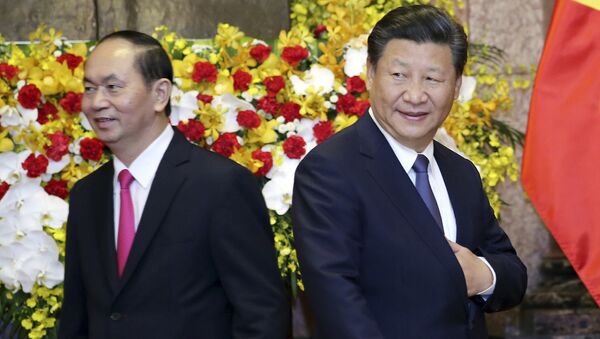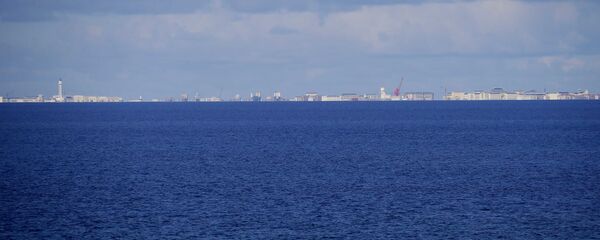China is keen to increase its bilateral cooperation with Vietnam, particularly on the South China Sea issue, without involving the US or other third party mediators, Director of the China Institute of International Affairs' Center for South Pacific Studies Shen Shishun told Sputnik.
Ahead of last weeks' Asia-Pacific Economic Cooperation (APEC) forum in Da Nanh, Chinese President Xi Jinping invoked the two countries' historical ties, noting that the two nations "fought shoulder to shoulder" in the struggle for independence.
In an article published on Thursday in Nhan Dan, the official newspaper of the Vietnamese Communist Party, Xi described the Vietnamese revolutionary leader Ho Chi Minh as "like a brother" to Chinese leaders such as Chairman Mao Zedong and Zhou Enlai. Zhou was the first Premier of the Republic of China, who served from October 1949 until his death in January 1976.

In light of US offers to mediate the territorial dispute, Shen told Sputnik that China is intent on coming to an agreement with the countries directly involved in the issue.
"This is China's consistent position – resolving the South China Sea problem within a bilateral framework. In fact, this is an effective way. The participation in this process of countries located outside the zone of the South China Sea can only complicate the problem further," Shishun said.
"They have their own interests, so their approaches to solving the problem are far from just; moreover, they create contradictions. In these conditions, it is in the interests of both China and Vietnam to solve this problem themselves."
"This problem is undoubtedly difficult, but there is no alternative to solving it on a bilateral basis. At the same time, China and Vietnam do not want to this problem to get worse, for it to affect the development of international relations."
"If I can help mediate or arbitrate, please let me know," Trump told the Vietnam President Tran Dai Quang during a meeting in Hanoi.
"I'm a very good mediator and arbitrator," Trump added.
Dr. Joseph Cheng, Professor of Political Science at the City University of Hong Kong, told Radio Sputnik that China will find it "difficult" to accept the US as a mediator in the dispute.

"It accepts to negotiate on a multilateral basis where the regional organization, ASEAN, is concerned. China tends to argue that the US is an extra-regional power which should have nothing to do with the South China Sea dispute and it is difficult for China to accept the US as a mediator," Cheng said.
Beijing claims most of the South China Sea as its territory, and in that belief it has undertaken construction projects there, building infrastructure on islands such as Tree Island, an islet in the Paracel Islands group.
In September, Hanoi announced it was "deeply concerned" about China's announcement of a military drill around the mouth of the Gulf of Tonkin, a body of water located off the coast of northern Vietnam and southern China.





